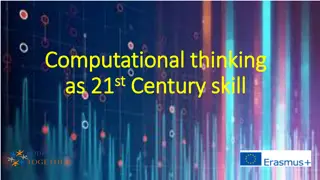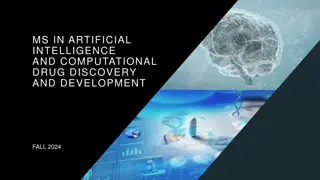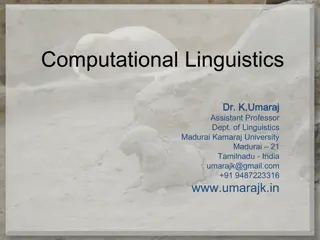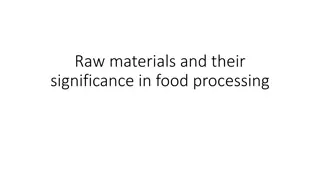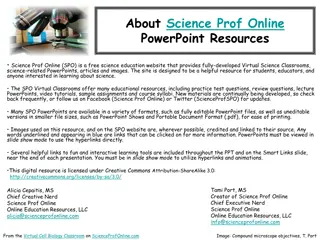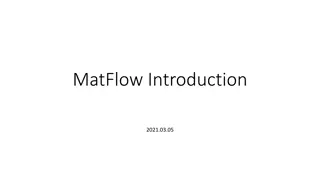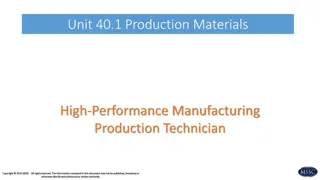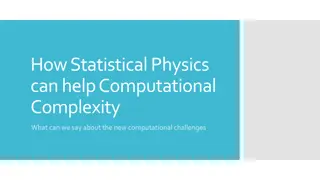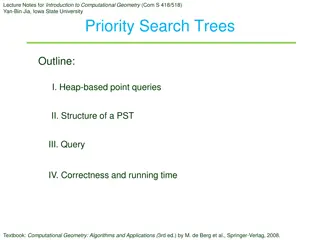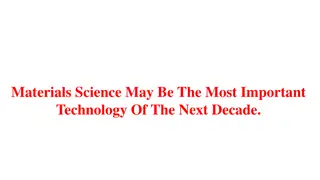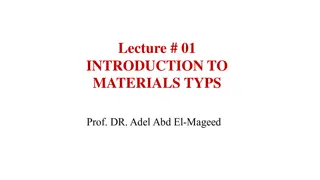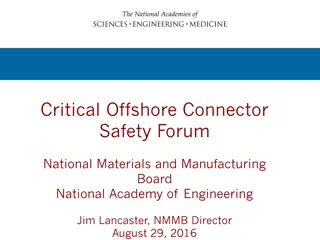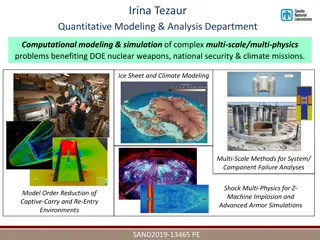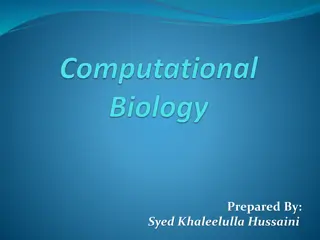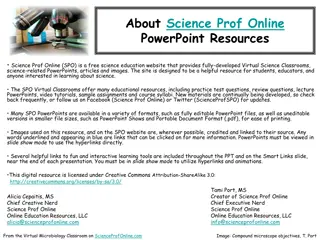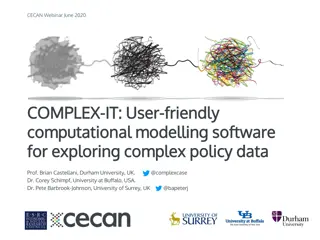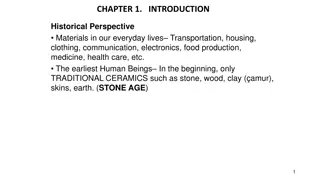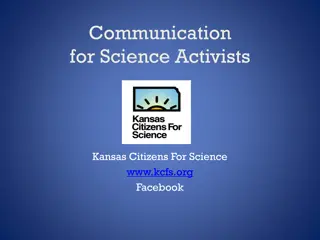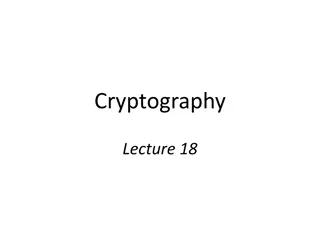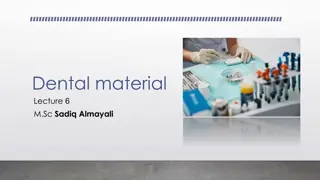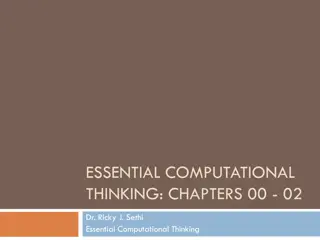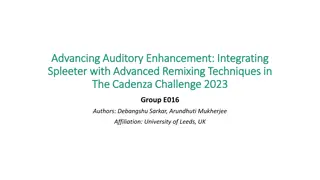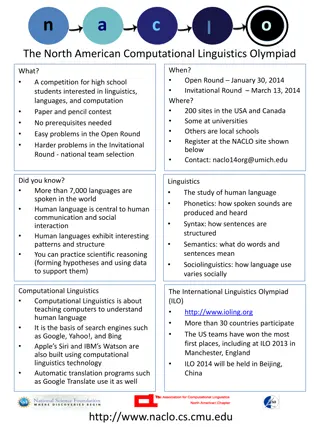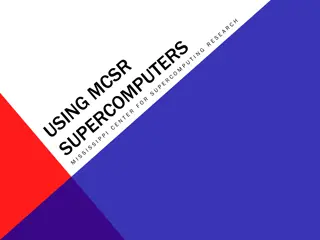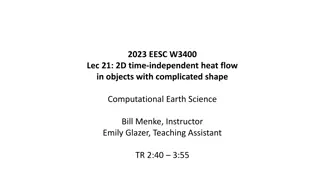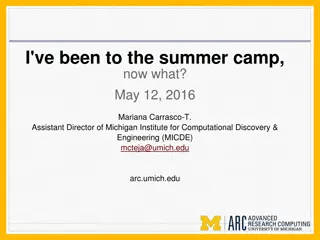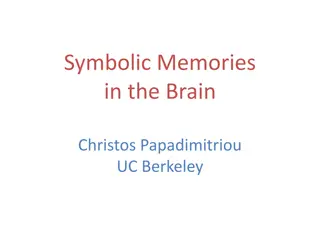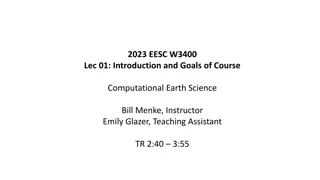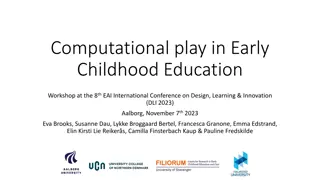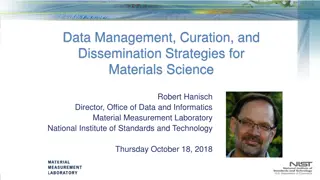M.Tech. (Computational and Data Science)
Get all the information you need about the M.Tech. (Computational and Data Science) course structure, duration, core courses, soft core courses, dissertation, and electives.
1 views • 14 slides
Predictive DFT Mixing: Successes and Opportunities in Materials Science
Laurie Marks from Northwestern University discusses the successes and opportunities in predictive DFT mixing, focusing on the advancements in density functional theory, fixed-point solvers, and the approach taken in physics and pragmatism. The presentation includes insights on the applications of DF
2 views • 52 slides
Understanding Signed Integers and Addition in Computational Systems
Dive into the world of signed integers, extensions, truncations, and addition in computer science with a focus on how negative values are represented and operated on. Explore concepts like sign-magnitude and two's complement representations, uncovering the intricacies of handling integers in computa
5 views • 25 slides
B.Sc (Arts) Courses and Colleges List for Science Students
If you\u2019re a 12th-grade student exploring undergraduate options in the B.sc science stream, consider the following list of recommended courses and colleges\nThe list of courses and colleges for the Science stream:\n1. B.sc (CS)\nThe BSc Computer Science, or BSc CS, is a 3-year undergraduate prog
8 views • 5 slides
Computational thinking as 21st Century skill
Computational thinking is a critical skill for the digital age, involving problem-solving techniques that enable computers to process information effectively. It precedes programming and requires breaking down complex problems into manageable steps. Educators emphasize computational thinking exercis
7 views • 4 slides
Master's Program in Computational Drug Discovery and Development - Fall 2024 Curriculum
This Master's program offers a comprehensive curriculum focusing on Artificial Intelligence, Computational Drug Discovery, and Development. With a blend of cutting-edge technologies and practical applications, students delve into techniques, AI/ML, big data mining, modeling, and more. Through intens
1 views • 7 slides
Understanding Computational Linguistics and Natural Language Processing
Explore the fascinating fields of Computational Linguistics and Natural Language Processing (NLP), delving into their development, applications, and significance. Learn about the study of human languages in computational models, the importance of corpora in linguistic research, and the various types
1 views • 33 slides
Significance of Raw Materials in Food Processing
Effective selection of raw materials is crucial for ensuring the quality of processed food products. The quality of raw materials directly impacts the final products, making it important to procure materials that align closely with processing requirements. Quality evaluation, including microbiologic
2 views • 30 slides
Understanding Dental Impression Materials and Techniques
Dental impression materials are essential in dentistry to create precise negative records of the oral tissues. The process involves obtaining a negative impression and then producing a positive reproduction using materials like dental stone. These materials must meet specific desirable properties to
1 views • 18 slides
Free Science Education Resources on Science Prof Online (SPO)
Science Prof Online (SPO) is a valuable free science education website offering fully-developed Virtual Science Classrooms, science-related PowerPoints, articles, and images. It serves as a comprehensive resource for students, educators, and anyone interested in science. Explore practice test questi
0 views • 17 slides
Free Science Education Resources at Science Prof Online (SPO)
Science Prof Online (SPO) is a comprehensive science education website offering Virtual Science Classrooms, science-related PowerPoints, articles, and images for students, educators, and anyone interested in science. The site provides various educational resources, including practice test questions,
0 views • 16 slides
Evolution of Algorithms and Computer Science Through History
The history of algorithms and algorithmic thinking dates back to ancient times, with the development of general-purpose computational machines by Charles Babbage in the 19th century marking a significant advancement. The term "computer science" emerged in 1959, encompassing theoretical computer scie
1 views • 39 slides
Introducing MatFlow: Open-source Python Tool for Computational Materials Science
MatFlow is an open-source Python code designed for computational materials science, running on HPC systems like CSF at Manchester. Users specify tasks to run in a workflow, with the main output being a workflow HDF5 file. The tool aims to make reproducibility and transparency easier, connect dispara
2 views • 10 slides
Engineering Materials and Production Techniques Overview
Learn about the various types of engineering materials used in high-performance manufacturing, including natural and synthetic materials. Explore the properties of materials, such as strength, conductivity, and resistance. Discover the different categories of metals, alloys, and polymers commonly ut
0 views • 19 slides
Exploring Complexity in Computational Theory
Dive into a world of computational complexity and theory with a focus on topics such as NP, P, PH, PSPACE, NL, L, random vs. deterministic algorithms, and the interplay of time and space complexity. Discover insights on lower bounds, randomness, expanders, noise removal, and the intriguing question
0 views • 17 slides
Understanding Computational Complexity Through Statistical Physics
In the age of vast data growth, tackling complex computational problems is crucial. Statistical physics can provide insights into handling the new challenges arising from the exponential increase in data. As we delve into understanding the complexity of computational tasks, it becomes evident that e
0 views • 24 slides
Introduction to Priority Search Trees in Computational Geometry
This lecture outlines the structure and query process of Priority Search Trees (PST) in computational geometry. It covers heap-based point queries, range trees for windowing queries, handling query ranges in 1D and 2D spaces, and using heaps to efficiently handle query ranges. The content discusses
1 views • 18 slides
Materials Science: Revolutionizing Innovation in the Next Decade
Materials science is poised to be the cornerstone of technological advancements in the next decade, addressing challenges such as clean energy, product innovation, and material supply disruptions. Scientists are leveraging advanced simulation techniques and machine learning to accelerate materials r
2 views • 15 slides
Understanding Materials Science and Engineering Fundamentals
Materials play a crucial role in our daily lives, influencing everything from transportation to communication. This lecture delves into the historical significance of materials, the distinctions between materials science and materials engineering, and the importance of structure-property correlation
0 views • 25 slides
National Academy of Engineering and Materials Science Insights
The National Academy of Engineering (NAE) and National Materials and Manufacturing Board (NMMB) provide expert advice on pressing challenges, promoting a vibrant engineering profession, and advancing technology. The NMMB focuses on materials science for engineering innovations, offering independent
1 views • 13 slides
Computational Complexity and NP-Complete Problems
In today's discussion, we delved into computational complexity and the challenges faced in finding efficient algorithms for various problems. We explored how some problems defy easy categorization and resist polynomial-time solutions. The concept of NP-complete problems was also introduced, highligh
0 views • 38 slides
Advancing Computational Modeling for National Security and Climate Missions
Irina Tezaur leads the Quantitative Modeling & Analysis Department, focusing on computational modeling and simulation of complex multi-scale, multi-physics problems. Her work benefits DOE nuclear weapons, national security, and climate missions. By employing innovative techniques like model order re
0 views • 6 slides
Understanding Computational Biology: Proteins, DNA, RNA, Genetics, and Evolution
Computational Biology combines computational methods with molecular biology to solve biological problems. Explore topics like proteins, DNA, RNA, and genetics, learning about amino acids, nucleotides, and the genetic code. Understand the evolutionary processes of mutation and natural selection.
0 views • 21 slides
Understanding X-Ray Diffraction Techniques in Materials Science
X-ray diffraction (XRD) analysis is a crucial technique in materials science for determining the crystallographic structure of materials. By irradiating a material with X-rays and measuring their intensities and scattering angles, XRD helps identify materials based on diffraction patterns. This meth
0 views • 5 slides
Free Science Education Website - Science Prof Online PowerPoint Resources
Science Prof Online (SPO) is a free science education website offering fully-developed Virtual Science Classrooms, science-related PowerPoints, articles, and images. This resource is designed to assist students, educators, and anyone interested in learning about science. The site provides a wide ran
0 views • 17 slides
Introduction to COMPLEX-IT: A User-Friendly Computational Modelling Software for Policy Data Exploration
Explore the capabilities of COMPLEX-IT, a web-based software tool designed to enhance researchers' access to computational social science tools. It offers a compact platform integrating case-based modelling, artificial intelligence, scenario analysis, and more. With an intuitive interface and quick
0 views • 14 slides
Evolution of Materials Science and Engineering in Human History
Explore the journey of materials in human history, from traditional ceramics to high-tech metal industry and beyond. Learn about the development of materials science and engineering, the different properties of materials, and the classification of materials into metals, ceramics, polymers, composite
0 views • 9 slides
Kansas Citizens For Science: Advocating for Science Education and Public Understanding
Kansas Citizens for Science (KCFS) is a nonprofit educational organization dedicated to promoting a better understanding and appreciation of science. Since its inception, KCFS has been actively involved in advocating for science education, educating the public about the nature and value of science,
0 views • 12 slides
Introduction to Computational Number Theory in Cryptography
Practical private-key cryptography can be done without advanced math, but understanding computational number theory is essential for public-key encryption. This field focuses on the computational difficulty of problems, analyzing algorithms' running times, classifying problems as easy or hard based
0 views • 27 slides
Understanding Rheology in Dental Materials
Rheology is a crucial aspect in dentistry as it deals with the flow properties of various dental materials, including liquids like molten alloy and impression materials. Viscosity plays a key role, determining how materials flow and behave. Different fluid classifications based on rheology, such as
0 views • 15 slides
Understanding the Essence of Computer Science and Computational Thinking
Delve into the fundamentals of Computer Science and Computational Thinking through chapters discussing the nature of science, predictions in physics, and the distinction between Computer Science and Computer Information Systems. Explore the relationships between Math, Physics, and Computer Science i
0 views • 29 slides
Advancing Auditory Enhancement: Integrating Spleeter with Advanced Remixing Techniques in The Cadenza Challenge 2023
Our project for The Cadenza Challenge 2023 focused on improving audio for headphone users with hearing loss by integrating Spleeter's deep learning capabilities. We utilized N-ALR prescriptions, Butterworth bandpass filters, and Dynamic Range Compression to enhance audio quality. By leveraging advan
0 views • 19 slides
North American Computational Linguistics Olympiad: A Competition for High School Students
The North American Computational Linguistics Olympiad (NACLO) is a competition for high school students interested in linguistics, languages, and computation. It consists of an Open Round in January and an Invitational Round in March, with no prerequisites needed. Participants tackle easy problems i
0 views • 4 slides
Mississippi Center for Supercomputing Research (MCSR) Overview
The Mississippi Center for Supercomputing Research (MCSR) supports computational research in various fields like Chemistry, Bioinformatics, Physics, Engineering, and Computer Science for Mississippi IHLs. They provide training to optimize computational resources, offer classes for computational trai
0 views • 23 slides
Computational Earth Science: Solving Heat Flow in Objects with Complex Shapes Using Finite Difference Method
Explore projects involving the Finite Difference Method for solving static heat conduction problems, also known as the Poisson Equation. Topics include testing boundary conditions, symmetry of solutions, point sources, dipoles, and more. Gain insights into changing boundary conditions and understand
0 views • 20 slides
Advanced Research Computing: Empowering Scientific Discovery and Innovation
Explore the world of Advanced Research Computing (ARC), encompassing high-performance computing clusters, data science resources, and collaborative initiatives at the University of Michigan. Discover how ARC supports computational research across diverse disciplines, offering training, consulting, a
0 views • 15 slides
Exploring Computational Theories of Brain Function
In this series of images and text snippets, the discussion revolves around the emerging field of computational theories of brain function. Various aspects such as symbolic memories, the relationship between the brain and computation, the emergence of the mind from the brain, and computational thinki
0 views • 53 slides
Computational Earth Science Course Overview
Explore the world of Computational Earth Science with Bill Menke as the instructor and Emily Glazer as the teaching assistant. The course aims to help you become proficient in applying Python-based computational methods to understand dynamic Earth Science phenomena. Through modeling, you will gain i
0 views • 34 slides
Exploring Computational Play in Early Childhood Education: DLI 2023 Workshop
The workshop at the 8th EAI International Conference on Design, Learning & Innovation (DLI 2023) in Aalborg aims to delve into the application of computational play with mathematics in early childhood education. Through live sessions and discussions, opportunities and challenges in utilizing computa
0 views • 7 slides
Data Management, Curation, and Dissemination Strategies for Materials Science
Robert Hanisch, Director at the National Institute of Standards and Technology, discusses data management, curation, and dissemination strategies for materials science. The presentation covers topics such as bio sketches, the Office of Data and Informatics, standard reference data, and making the mo
0 views • 51 slides




